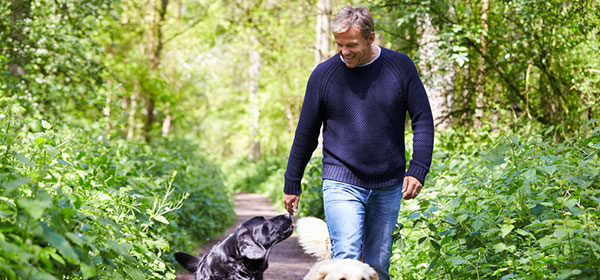As little as one hour of exercise each week could bolster our defences against depression – regardless of age, gender or current fitness level.
That’s the finding of Black Dog Institute – a facility that combines clinical services with research, training and community education – based on its study of almost 34,000 adults over 11 years. And its message in ‘Exercise Your Mood’ week is to highlight the power of physical activity to improve mental health.
Black Dog Institute Associate Professor Sam Harvey said: “The current exercise habits of many Australians are concerning. Many people suffer from depression, but there is a lot of exciting research that is beginning to tell us how we may be able to reduce the amount of depression in our communities.
“Our study shows that encouraging people to take on just a small amount of exercise each week could have a significant impact on depression rates more broadly.”
Black Dog Institute ambassador and fitness guru Michelle Bridges says: “I’ve seen first-hand the positive impact exercise can have on a person’s mental health, which is why I’m so passionate about getting people moving. And we’re not talking running marathons or climbing Everest here – just adding in a little bit of extra activity can really make a big difference.”
According to the Australian Bureau of Statistics (ABS) Australian Health Survey, 20 per cent of adults do not undertake any regular physical activity, and more than one-third spend less than 90 minutes per week being physically active. When ranked against the National Physical Activity Guidelines for adults – to do at least 30 minutes of moderate intensity physical activity on most days – only 43 per cent met the threshold.
The survey found: “Levels of physical activity tended to decline in older ages, with the lowest being among people aged 75 years and over, where the average time spent in physical activity was 20 minutes per day, and just one in four this age were classified as sufficiently active against the guidelines.”
The ABS survey also showed that around one million Australians are living with depression, with one in five people aged 16 to 85 experiencing a mental illness in any year.
Assoc. Prof. Harvey’s research found that 12 per cent of cases of depression might have been prevented if participants undertook just one hour of physical activity each week. It also found that people who reported doing no exercise had a 44 per cent higher risk of developing depression compared to those who exercised one to two hours a week.
Key findings of the Black Dog Institute study:
- undertaking regular leisure-time exercise was associated with reduced incidence of future depression
- 12 per cent of depression diagnoses might have been prevented with one hour of exercise per week
- study participants who reported doing no exercise at all had a 44 per cent increased chance of developing depression
- the exact link between exercise and mental health is unknown, but the social and physical health benefits of exercise are believed to be protective factors
- relatively modest changes in levels of exercise across the population may have important public health benefits by reducing the incidence of depression.
“These findings show that modest amounts of exercise – from just one hour per week at any intensity – may be able to deliver protection against depression,” said Assoc. Prof. Harvey.
“This is a really small change that people can easily incorporate into their lives that can have an enormous benefit to their mental health.”
Ms Bridges says people just need to take the first step.
“Finding the motivation to get started can be the hardest part, but simply adding in a few minutes of activity each day can be all it takes to get moving long term,” she said. “It doesn’t need to be high intensity to benefit your mental health. Even a quick walk can help.
“Keeping fit is part of my job, but I also use exercise to de-stress and unwind. It helps me to feel better prepared to tackle the challenges of a busy modern life. One hour a week is not much to ask – we spend more time than that flicking through channels trying to find something to watch on TV.”
Do you exercise for at least an hour a week? Have you had success in fighting depression with exercise?
There is always someone to hear your problems. If you need support, call one of these 24-hour, seven-day a week counselling services:
- Lifeline Australia – 13 11 14
- MensLine Australia – 1300 78 99 78
- Suicide Call Back Service – 1300 659 467
- Beyond Blue – 1300 22 4636
- Veterans and Veterans’ Families Counselling Service – 1800 011 046.
Related articles:
Boost memory function
Waging war on broken bones
Exercise to avoid falls

